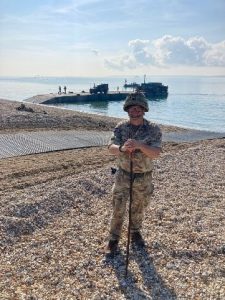Chaplaincy on a different beach head
Revd Andy Earl is the Assistant Diocesan Safeguarding Advisor. He is also a former member of the Armed Forces and a current reservist.
Andy shares his story:
 It had been a busy few weeks in the lead up to D day preparations which had been focused on amassing material, ships, boats and plant. Some had been preparing for years, some within a much shorter time frame. For each individual there was an individual story of leaving work, home and loved ones.
It had been a busy few weeks in the lead up to D day preparations which had been focused on amassing material, ships, boats and plant. Some had been preparing for years, some within a much shorter time frame. For each individual there was an individual story of leaving work, home and loved ones.
As the sea gently swayed, the beach head that was established only a few hours previously was barely visible. The supply ship began to unload onto the MEXEFLOTE (a motorised barge platform) and the Combat Support Boat began ferrying the General and his staff to the shore to join the Beachhead Support Group.
As we landed accurate small arms fire was heard and we were forced to take a belt buckle and began retreating in tactical bounds until we were at the edge of the shore the sea lapping at our toes. A successful counter attack was launched and the beachhead was once again ready to receive armour and supplies.
This was not a chaplain’s reflection from D Day 1944 but my reflection from this year’s annual training camp with 165 Port and Maritime Unit, and an analogy to the move between regular and reserve service.
My transfer process after 12 years regular service in some ways mirrors the above. Transferring is a reasonably straight forward process and included, for me a required over age extension. The first major change is that reserve service becomes one of a number of competing demands that are clearer than I remember in regular service.
All reservists are volunteers who combine, work, home, family and their reserve service. This mix brings a rich diversity of skills and approaches and often their day time employment bears little resemblance to their military trade choice in both role rank and status,
This rich mix makes for an interesting congregation and deep camaraderie and opportunities to provide the ministry of presence and engagement.
Joining a new unit is always challenging, and establishing yourself as a reserve chaplain presents unique demands. How do you offer a ministry of presence over seven sites with many reserves completing a maximum of two hours per week?
A quiet or not so quiet presence at major events has provided a foothold and I look forward to breaking out.
Chaplaincy for me has always been felt as a sense of call
Chaplaincy for me has always been felt as a sense of call, hitting the age bar to continued regular service gave a space for reflection but after prayerful deliberation; I still felt I had something to offer.
Reserve Service for me has provided a link to a familiar shore but with a very different beach to stroll alongside those who I am privileged to support, if you haven’t looked at service in the reserves then please consider, or reconsider it.
There are many beachheads where the light of Christ needs to shine, as the dawn continues to break over new horizons both in theological and personal terms. Whatever you are called to be I wish you well.
